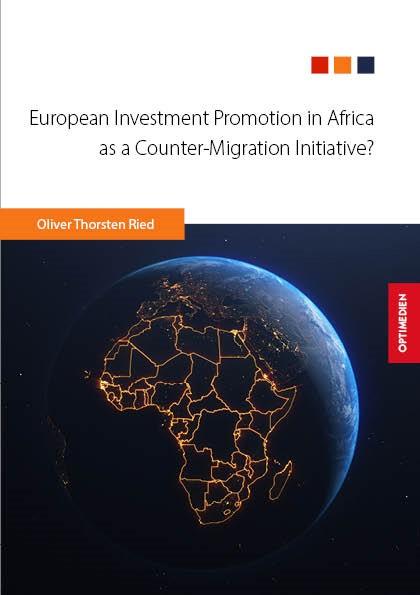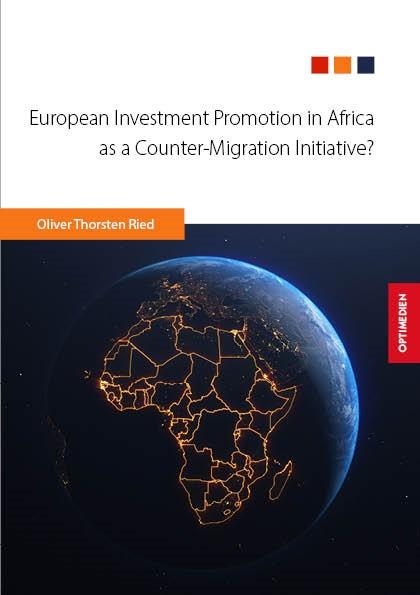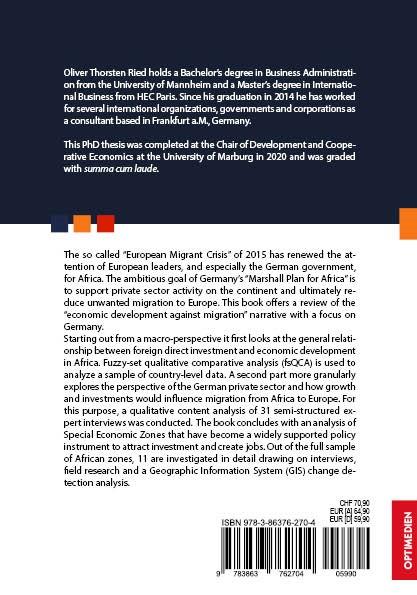European Investment Promotion in Africa as a Counter-Migration Initiative?
- Urheber: Ried, Dr. Oliver Thorsten
- Verfügbarkeit: Auf Lager
- EAN: 9783863762704
€59,90
Inhalt The so called “European Migrant Crisis” of 2015 has renewed the attention of European leaders, and especially the German government, for Africa. The ambitious goal of Germany’s “Marshall Plan for Africa” is to support private sector activity on the continent and ultimately reduce unwanted migration to Europe. This book...
Inhalt
The so called “European Migrant Crisis” of 2015 has renewed the attention of European leaders, and especially the German government, for Africa. The ambitious goal of Germany’s “Marshall Plan for Africa” is to support private sector activity on the continent and ultimately reduce unwanted migration to Europe. This book offers a review of the “economic development against migration” narrative with a focus on Germany.
Starting out from a macro-perspective it first looks at the general relationship between foreign direct investment and economic development in Africa. Fuzzy-set qualitative comparative analysis (fsQCA) is used to analyze a sample of country-level data. A second part more granularly explores the perspective of the German private sector and how growth and investments would influence migration from Africa to Europe. For this purpose, a qualitative content analysis of 31 semi-structured expert interviews was conducted. The book concludes with an analysis of Special Economic Zones that have become a widely supported policy instrument to attract investment and create jobs. Out of the full sample of African zones, 11 are investigated in detail drawing on interviews, field research and a Geographic Information System (GIS) change detection analysis.
Details
- Titel: European Investment Promotion in Africa as a Counter-Migration Initiative?
- Autor: Oliver Thorsten Ried
- Auflage: 1. Auflage
- Coverfoto: © Sono Creative – stock.adobe.com
- Hochschule: Philipps-Universität Marburg
- Note: Summa cum laude
- Erschienen: 28.06.2021
- Fachbereich: Wirtschaftswissenschaft
- Produkttyp: Buch (Gebunden)
- Produktart: Dissertation
- Sprache: Englisch
- Einband: Softcover (Paperback)
- Maße: 21,0 x 14,8 cm (DIN A5)
- Umfang: 571 Seiten
- Zustand: Neu (eingeschweißt in Folie)
- Keywords: Africa, African Zones, Counter-Migration, Economic Growth, European Investment Promotion, Financial infrastructure, fsQCA, Fuzzy-set qualitative comparative analysis, Investment Flows, Special Economic Zone
Autor
Oliver Thorsten Ried holds a Bachelor’s degree in Business Administration from the University of Mannheim and a Master’s degree in International Business from HEC Paris. Since his graduation in 2014 he has worked for several international organizations, governments and corporations as a consultant based in Frankfurt a.M., Germany.
Inhaltsverzeichnis
Tables
Figures
Abbreviations
Acknowledgments
Part I: Introduction and Preliminary Thoughts
1. Introduction
1.1 Structure
1.2 Research Questions and Hypotheses
1.3 Research Approach – Methodology
1.3.1 Investment and Economic Growth – Methodology
1.3.2 Migration Prevention and Private Sector Opportunity – Methodology
1.3.3 Special Economic Zones in Africa – Methodology
2. Macro trends, Growth Opportunities and Economic Drivers
2.1 Demographic Changes
2.1.1 Population Growth
2.1.2 Rising Middle Class
2.1.3 Urbanization
2.2 Natural Resource (In-)Dependence
Part II: Analysis
1. Investment and Economic Growth
1.1 Investment Flows and Inclusive Growth – What we know
1.1.1 FDI Flows to Africa
1.1.2 Literature Review – FDI and Inclusive Growth
1.1.2.1 FDI – Theoretical Concept and Empirical Evidence
1.1.2.2 FDI’s Impact on Growth – Theoretical Concepts and Empirical Evidence
1.2 FDI Impact on GDP Growth, Human Development Index and GINI Coefficient – Analysis and Findings
1.3 Investments and Development - Intermediate Conclusion
2. Migration Prevention and private sector opportunity
2.1 Migration – What we know
2.1.1 Foundations of Migration Research
2.1.2 Ability and Desire
2.1.3 Push and Pull Factors
2.1.4 Refugees
2.1.5 Origin and Destinations
2.1.6 The Role of Remittances and Other Effects of Migration in Home Countries
2.2 Migration and Investments – Analysis and Findings
2.2.1 Opportunities for German Investors
2.2.1.1 Development of Domestic Spending Power
2.2.1.2 Promising Sectors
2.2.1.3 Countries of Interest for Investors
2.2.1.4 International Competition
2.2.2 Challenges for Investors
2.2.2.1 Value Chains, Logistics, Infrastructure
2.2.2.2 Information Deficit
2.2.2.3 Inadequate Products
2.2.2.4 Corruption and Bureaucracy
2.2.2.5 Education and Training
2.2.2.6 Financing
2.2.2.7 Small Markets
2.2.2.8 Rule of Law
2.2.2.9 Risk Aversion
2.2.2.10 Lack of Focus and Capacity
2.2.2.11 Other Challenges
2.2.3 Mitigation of Investment Obstacles
2.2.3.1 Holistic Approach
2.2.3.2 What African Countries can do
2.2.3.3 What Germany can do
2.2.3.4 Companies’ Interest in Support
2.2.3.5 What Firms can do
2.2.4 Potential Impact on Migration to Europe
2.2.4.1. Immediate Impact
2.2.4.2 Number of Jobs that can be created
2.2.4.3 Caveats
2.2.5 Long-term Impact and Room for Action
2.3 Economic Development and Migration Movements – Intermediate Conclusion
3. Special Economic Zones – The magic key?
3.1 Special Economic Zones – What we know
3.1.1 What are Special Economic Zones?
3.1.2 Zone Performance – The Theory
3.1.2.1 FDI Attraction
3.1.2.2 Job Creation
3.1.2.3 Export Growth
3.1.2.4 Structural Effects
3.1.2.5 Success Factors
3.1.3 Special Economic Zones in Africa
3.2 Special Economic Zones in Africa – Analysis and Findings
3.2.1 SEZ programs in Africa – A comparison
3.2.1.1 Ethiopia
3.2.1.2 Rwanda
3.2.1.3 Kenya
3.2.1.4 Nigeria
3.2.1.5 Gabon
3.2.1.6 Morocco
3.2.1.7 Angola
3.2.2 SEZ-based Job Creation Strategies in Africa – Four Case Studies
3.2.2.1 Mono-thematic Production for Export – Bole Lemi Industrial Park, Ethiopia
3.2.2.2 Multi-Purpose – Kigali SEZ, Rwanda
3.2.2.3 The Chinese Zone – China Eastern Industry Zone, Ethiopia
3.2.2.4 Multi-Industry Export Zone – Athi River EPZ, Kenya
3.3 Special Economic Zones – Intermediate Conclusion
Part III: Results
1. Conclusion
2. Limitations and Future Research Opportunities
Bibliography
Appendix
1. fsQCA Scatterplots
2. Interview Transcripts
2.1 Michael Oos
2.2 Nigerian Investor
2.3 Alexander Schwörer
2.4 Andreas Wenzel
2.5 Kurt Jansen and Thomas Rolf
2.6 Bruno Wenn
2.7 Official 1
2.8 Manager 2 – Consumer Goods
2.9 Christoph Kannengießer
2.10 Dr. Thomas Helle
2.11 Dr. Michael Brüntrup
2.12 Dr. Abdul Kamara
2.13 James Wakiaga
2.14 William Muhwava
2.15 Norbert Noisser
2.16 Manager 1 – Industrial equipment
2.17 Dr. Saliou Barry
2.18 Hinrich Behrens
2.19 Ibrahima Sory Camara
2.20 Ibrahim Camara
2.21 Ibrahima Cofing Diallo
2.22 Marcus Miller
2.23 German Engineer
2.24 Olivier Clément
2.25 Manager 3 – Industrial Equipment
2.26 Manager 4 – Development Cooperation
2.27 Business Owner 1 and 2 – Professional Services
2.28 EU Official 1
2.29 Political Advisor – Rwanda
2.30 Economic Advisor – Development Cooperation
2.31 Kenyan Official
3. List of Special Economic Zones in Africa
4. Site visits
4.1 Bole Lemi Industrial Zone Site Visit – Ethiopia
4.2 China Eastern Industry Zone Site Visit – Ethiopia
4.3 Kigali SEZ Site Visit with Rwanda Development Board – Rwanda
4.4 Export Processing Zone Athi River Site Visit - Kenya
4.5 SEZ and Technology Park Grand Bassam – Côte d’Ivoire
5. Change Detection Maps and High-resolution Image Comparison
6. Change Matrix
Downloads
DRM: Digitales Wasserzeichen
Dieses eBook enthält ein digitales Wasserzeichen und ist damit für Sie personalisiert. Bei einer missbräuchlichen Weitergabe des eBooks an Dritte ist eine Rückverfolgung an die Quelle möglich.
Dateiformat: PDF (Portable Document Format)
Mit einem festen Seitenlayout eignet sich die PDF besonders für Fachbücher mit Spalten, Tabellen und Abbildungen. Eine PDF kann auf fast allen Geräten angezeigt werden, ist aber für kleine Displays (Smartphone, eReader) nur eingeschränkt geeignet.
Systemvoraussetzungen:
PC/Mac: Mit einem PC oder Mac können Sie dieses eBook lesen. Sie benötigen dafür einen PDF-Viewer - z.B. den Adobe Reader.
eReader: Dieses eBook kann mit (fast) allen eBook-Readern gelesen werden. Mit dem amazon-Kindle ist es aber nicht kompatibel.
Smartphone/Tablet: Egal ob Apple oder Android, dieses eBook können Sie lesen. Sie benötigen dafür einen PDF-Viewer - z.B. den Adobe Reader.
Buying eBooks from abroad
For tax law reasons we can sell eBooks just within Germany and Switzerland. Regrettably we cannot fulfill eBook-orders from other countries.



